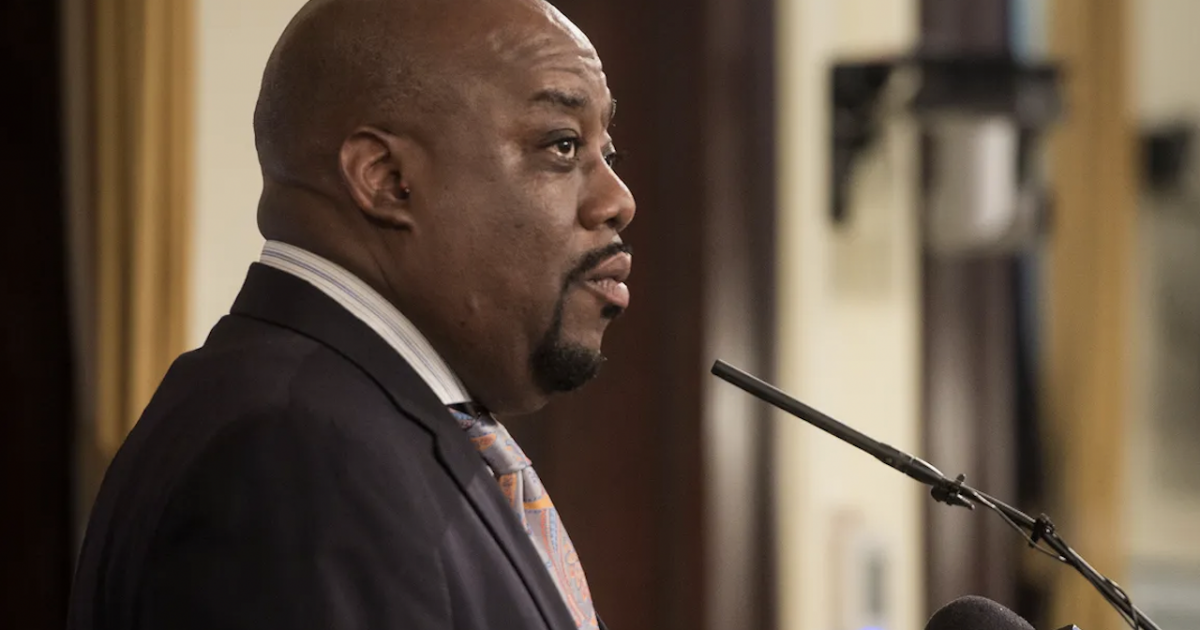Mayor Johnson Says He's a Cancer Survivor
- Savannah’s mayor, Mayor Van Johnson, revealed this week that he is a prostate cancer survivor.
- Johnson credits early detection with saving his life.
- It's important to screen for prostate cancer via prostate-specific antigen (PSA) test.
The 67th Mayor of the City of Savannah, GA, is sharing his story and also urging others to get screened for prostate cancer in honor of Prostate Cancer Awareness Month.
Read MoreMayor Johnson’s Prostate Cancer Journey
At his weekly press conference, Mayor Johnson revealed this week that he is a cancer survivor and that he battled prostate cancer during the COVID-19 pandemic. Johnson took mayoral office in January 2020, and later that year, he was diagnosed with prostate cancer, he says. It was during a routine annual physical that Johnson’s doctor got the results of his PSA test, which showed “concerning numbers,” reports Savannah Morning News. (PSA tests screen for prostate cancer.) Johnson’s test indicated the presence of a cancerous tumor.His doctor administered more tests, along with a biopsy. And Johnson recalls at the press conference how, in August 2020, he got “the call no one wants.” His doctor said he had prostate cancer.
Johnson says, “There was too much going on [with the pandemic]. We had a city I'm serving, facing challenges unlike ever before. We're partially open, partially closed. We're waiting on some sort of vaccine. We have people who are at home facing economic challenges like never before."
He continues to say he was surprised because he didn’t think he fit the “prototype.” Johnson was only 51 at the time of diagnosis and considered himself pretty healthy.
"I had to ultimately make the decision of whether I wanted to live or die,” he says vulnerably. “Fortunately, and thank God, because of early detection, because I had the information because the cancer was still contained within the prostate and had not moved out… because it had not spread, I was able to have a wide plethora of treatment options and I was able to actively monitor for a year," Johnson says. "Then, in November of last year, I underwent surgery to treat my prostate cancer.”
Johnson’s surgery was successful, and today he is a survivor of prostate cancer. He recently had his third follow-up exam, which showed he remains cancer-free.
There's No One Definitive Symptom for Prostate Cancer, But There Are Clues
Screening for Prostate Cancer
Men of certain ethnicities, such as Black men like Mayor Johnson, are at a higher risk of developing prostate cancer, so a doctor may opt to begin testing in the mid-40s. Men with a family history of prostate cancer may also want to consider screening early.
Screening is typically done with the PSA test. PSA is a protein secreted by the prostate gland; a large amount of PSA in a person's body can indicate that cancer cells are growing. But that is not always the case. (For example, if a man has an elevated PSA level, he has somewhere between a 20% to 40% chance of having cancer.)
The PSA test is not a perfect test, says Dr. Edwin Posadas, director of the Translational Oncology Program at Cedars-Sinai Medical Center in Los Angeles.
The PSA test is more controversial when it comes to using it to detect prostate cancer in older men. This is because most men will develop prostate cancer at some point in their lives if they live long enough, Dr. Geoffrey Sonn, assistant professor of urology at Stanford Medicine, tells SurvivorNet. But most men will not die from prostate cancer.
In addition, because prostate cancer is such a slow-growing type of cancer, it is much more likely that older men will die of something other than prostate cancer.
PSA Test is Not Perfect But it is Helpful
Keep a Cancer Battle Private? Or Go Public?
We admire public figures like Mayor Van Johnson, who use their own cancer diagnosis to raise awareness about the disease and about screening procedures.
It’s an entirely personal choice about whether or not you’d like to share your cancer diagnosis with others or to keep it private. Health is a deeply personal matter, and it's up to you and you alone to determine who has the right and privilege to know about your diagnosis.
It's important to do what feels right to you after your diagnosis and not cave into any pressure to share your diagnosis with others before you're ready or to share it more widely than you'd like. You have autonomy over your health and the sharing of any news related to it.
Dr. Marianna Strongin, a licensed clinical psychologist and founder of Strong In Therapy Psychology, tells SurvivorNet that whether someone shares this heavy news is their personal preference.
"I recommend sharing; I'm a therapist," Strongin says with a laugh, "but to whom and how many people is up to the person (with cancer)."
There are plenty of people who have chosen not to share their cancer battle publicly, as Mayor Johnson did. While Strongin says that she encourages sharing, she also recognizes there's also a personality factor at play when it comes to whether a person shares this deeply personal news; some people are more willing to share, and some are just more private, Strongin adds. The difference, she says, is what's the process in sharing versus not sharing.
Strongin mentions one of her patients who has explored the reasons why she didn't tell people about her cancer diagnosis. For the patient, Strongin says, "it was coming to terms with the identity of being sick."
"Being sick is something she never wanted something she never wanted to acknowledge to herself," Strongin adds. "It was safer to temporarily do that (identify as sick) for herself," but the long-term impacts of telling others the same thing were unknown, which can be a scary thought.
Telling Your Loved Ones You Have Cancer How Do You Break the News?
Learn more about SurvivorNet's rigorous medical review process.


